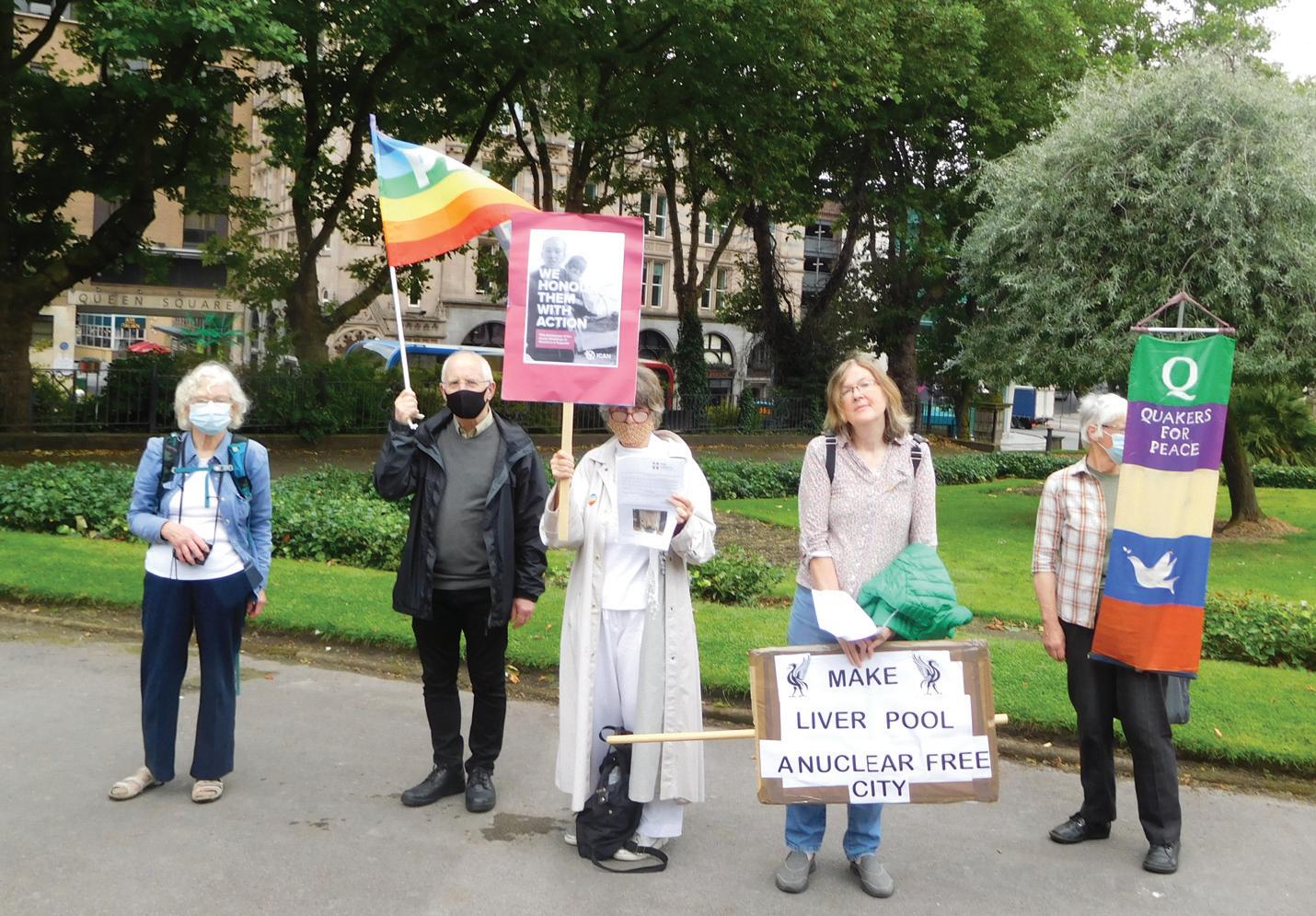
18 minute read
News
News diary
If you’ve got any news from your parish that you’d like featured e-mail us with the details at: catholicpictorial@rcaol.co.uk
Advertisement
Hiroshima and Nagasaki remembered
On 6 August Liverpool marked 75 years since two atomic bombs were dropped on the cities of Hiroshima and Nagasaki. There was a gathering in St John’s Gardens attended by the Lord Mayor, Anna Rothery, and peace groups including members of Pax Christi. During the service a wreath was laid to remember all victims of the bombing. By the end of 1945 it was estimated that 250,000 civilians had lost their lives through the bombing and radiation poisoning. The service included music, reflection, prayer and statements from Pope Francis. Pope Francis has condemned the use and possession of nuclear weapons. In 2019 he visited Nagasaki and called on all countries to support action for nuclear disarmament and non -proliferation, by using international legal instruments such as the Treaty for the Prohibition of Nuclear Weapons (TPNW). The Vatican was among the first states to ratify this treaty, which is also supported by Archbishop Malcolm McMahon. Following the Pope’s visit to Nagasaki he wrote: ‘Here is an opportunity for the leaders of nuclear weapons possessing countries, such as the UK, to demonstrate creative
moral courage. We call on our government to sign the Treaty for the Prohibition of Nuclear Weapons and be part of a future built on just international relationships and the common good of all humanity.’ Liverpool Pax Christi have sent a message of support to partners in Hiroshima and Nagasaki. In 2018 they met with a survivor of Hiroshima who visited Liverpool as part of a world tour organised by the International Campaign for the Abolition of Nuclear Weapons. The survivors (known as Hibakusha) continue to play a pivotal role in protecting the world from nuclear catastrophe. Jan Harper of Liverpool Pax Christi said: ‘In commemorating this anniversary, we are called to work for disarmament; this pandemic has made us aware that we are one global family, vulnerable to threats we cannot easily control. There is a real risk of nuclear war by intent or accident. Hiroshima and Nagasaki have given us a warning of the effects of nuclear weapons which threaten the future of the planet. The money we spend on nuclear weapons should be diverted into healthcare, education and housing, and saving the earth. We have asked our MPs to lobby the government to sign the Nuclear Ban Treaty (TPNW) which needs 50 countries to ratify it, but the UK is one of the nine most powerful nuclear weapons states which have refused to sign, or play any part, in the discussions of the treaty.’ Members of Pax Christi are also campaigning for local authorities in Merseyside to support the treaty by joining ‘Cities of Peace ‘across the world, such as Manchester, Norwich, Edinburgh, Barcelona, Washington DC, Paris and Geneva. Archbishop Malcolm McMahon is the President of the British branch of Pax Christi, the international Catholic peace movement which was founded after the second World War.
For further information: www.paxchristi.org.uk Liverpool Pax Christi group: Email: janharper1@yahoo.co.uk
Clergy appointments
Father John Cullen has retired as parish priest of St Edmund of Canterbury, Waterloo and Father Dominic Curran will take on the additional pastoral responsibility for the parish. Father Bernard Higham has retired as parish priest of Our Lady of Compassion, Formby and Monsignor John Walsh will take on the additional pastoral responsibility for the parish Father Brian Dougherty has retired as assistant priest at St Mary of the Isle, Douglas, St Anthony, Onchan, and St Joseph, Willaston. Monsignor Peter Fleetwood will move from St George’s, Maghull to be on loan to the Diocese of Copenhagen and will be parish priest of the Faroe Islands. Father Patsy Foley will be parochial administrator of St George’s, Maghull.
Our Parish Communities
by Father Philip Inch, Episcopal Vicar for Mission Planning
At the beginning of summer (July 20th) the Vatican issued an instruction which Pope Francis had signed at the end of June. It is called: The Pastoral Conversion of the Parish community in the service of the evangelising mission of the Church. That is something of a mouthful, but the document is a reflection on the Parish.
Why did the Pope sign, and the Vatican issue such a document? For many of us the way we experience the Church is through our parish, through its priest (s) and so is it a timely reminder to all of us what the parish is all about and particularly at this time when we have been through ‘lockdown’ and so have been made to think again and afresh about what it means to belong to a parish. The document clearly says that nothing new is being proposed here – it is gathering together the riches of church teaching, practice and law.
The document reminds us of three important things: 1. The Parish exists for pastoral conversion. The Parish must be missionary. 2. The situation of the world today means we have to re-think what it means to be a Parish. It can no longer just be defined as a territory in which we live. We have to be open to new ways of being a Parish. 3. The structures that exist in a Parish are at the service of its mission and we must not be afraid to try new and innovative expressions of Parish.
1. Pastoral Conversion: Pope Francis repeatedly says that Parish communities must be places that are ‘ever more conducive to an encounter with Christ.’ He says: ‘we should be disturbed by the fact that so many of our brothers and sisters live without the strength, light and consolation born of friendship with Christ, without a community of faith to support them.’ (EG 49) The Word of God dwells in our midst, hence the importance of the Parish, a home amongst the homes of an area. And in order for the journey of the Word to continue the Catholic community must make a determined missionary decision: ‘capable of transforming everything, so that the Church’s customs, ways of doing things, times and schedules, language and structures can be suitably channelled for the evangelisation of today’s world rather than for her selfpreservation.’ (EG 27)
2. The value of the Parish in a contemporary context: According to the new instruction, the current model of Parishes no longer measures up to most people’s expectations: Whereas the parish church was once a community’s primary gathering space, people now have many other places—in person and virtual—to gather, weakening their commitment to their geographic neighbours. As a result of this change, the document says, ‘any pastoral action that is limited to the territory of the Parish is outdated, which is something the parishioners themselves observe when their Parish appears to be more interested in preserving a nostalgia of former times as opposed to looking to the future with courage.’ A missionary Parish, rather than remaining focused on preserving the existing community, is ‘”called to reach out to everyone, without exception,” particularly the poor.’

3. The Parish and its structures within the Diocese. This is the longest section of the document and it talks about restructuring parishes. It reminds us that parishes must be led by priests, but clearly in the context of working with others. The priest has a role, but he cannot carry this out if he is not in collaboration with others, with priests, with religious, with deacons and with lay people. There is a stress on parish councils and on finance committees. Any re-organisation of parishes within a Diocese must be done in consultation with people. The Pope compares it to the way he is trying to reform the Roman Curia – you have to take people along with you. It is no good imposing from ‘the top.’ There is seen in the instruction a clear role for emerging lay ministries. It talks about lay-pastoral associates, about lay funeral ministers and about people in different parishes working together. The document reminds us that there is already in place the mechanism for trying new ways of re- structuring our parishes, always for the good of the people they serve. It is clear that we must not be afraid and we must not be tied down by the ‘old ways’ of doing things. I hope this short article will have given you the encouragement you need to read the whole document: you can find it here: http://press.vatican.va/content/salastampa/en/bollettino/pubblic o/2020/07/20/200720a.html
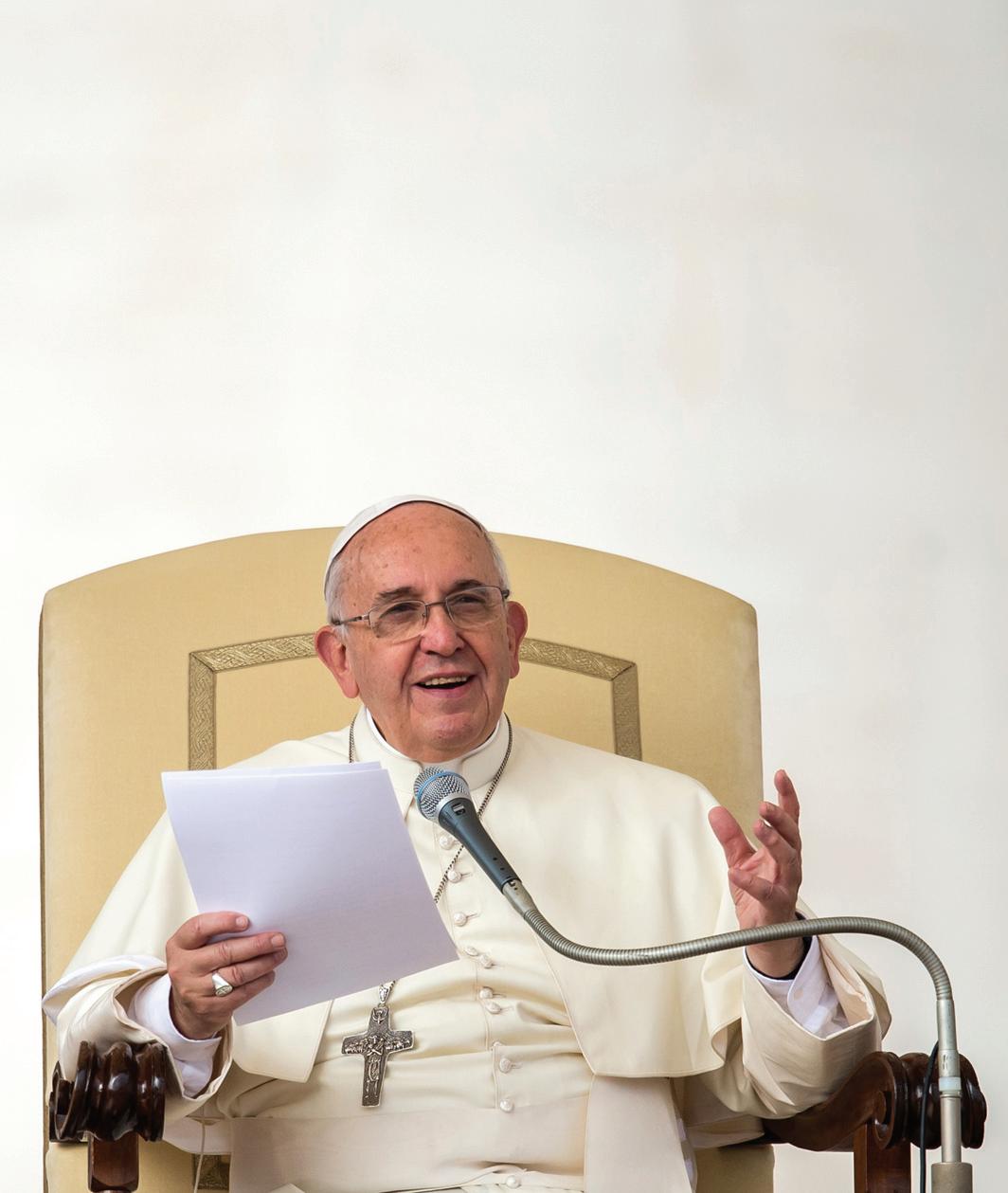
news diary Bicentenary of the birth of Mother Mary Joseph of Jesus, Sister Elizabeth Prout
Foundress of the Sisters of the Cross and Passion born on 2 September 1820
by Sister Dominic Savio CP
Mother Mary Joseph (Elizabeth Prout) brought the Sisters of the Cross and Passion into what is now the Archdiocese of Liverpool in 1855, when, at the inspiration of Father Bernardine Carosi CP, Rector of the Passionist monastery in Sutton, the Misses Orrell of Blackbrook asked her to open a convent in Parr Hall, to take charge of Parr Hall girls’ academy and to open day and Sunday schools for the working-class children in Blackbrook, as well as taking charge of St Anne’s day and Sunday schools in Sutton. Reducing the fees at Parr Hall to open the school to middle and upper working-class girls, Mother Mary Joseph admitted day pupils as well as boarders and introduced a school uniform to eradicate class distinctions in dress. She opened a convent in Sutton where she personally taught in St Anne’s school and in 1857 opened St Joseph’s school, Peasley Cross. Apart from a break from 1979–1984, the Sisters of the Cross and Passion have remained in Sutton to the present day. They were also in Warrington from 1899, teaching in St Mary’s girls’ and infants’ schools from 1899 to 1967; St Benedict’s from 1901 to 1975; St Alban’s 1902 to 1970; St Oswald’s from 1929 to 1988; St Stephen’s from 1957 to 1983; and English Martyrs’ from 1959 to 1984. After retiring from the schools, they remained in Warrington, playing an active role particularly in St Oswald’s parish from 1988 to 2016. The Sisters of the Cross and Passion have been in the City of Liverpool since 1909, teaching and doing parish work in St Hugh’s. As a result of war damage in 1946, however, they had to move their convent to North Drive, Wavertree. That area was in Our Lady’s parish and so some Sisters continued to teach and do parish work in St Hugh’s and others arrived to do parish work in Our Lady’s. The Sisters continued to teach in St Hugh’s school until 1990. In 2013 they opened another convent, with two Sisters working in schools and in St John’s parish, Kirkdale. In 2017, with the rearrangement of parishes
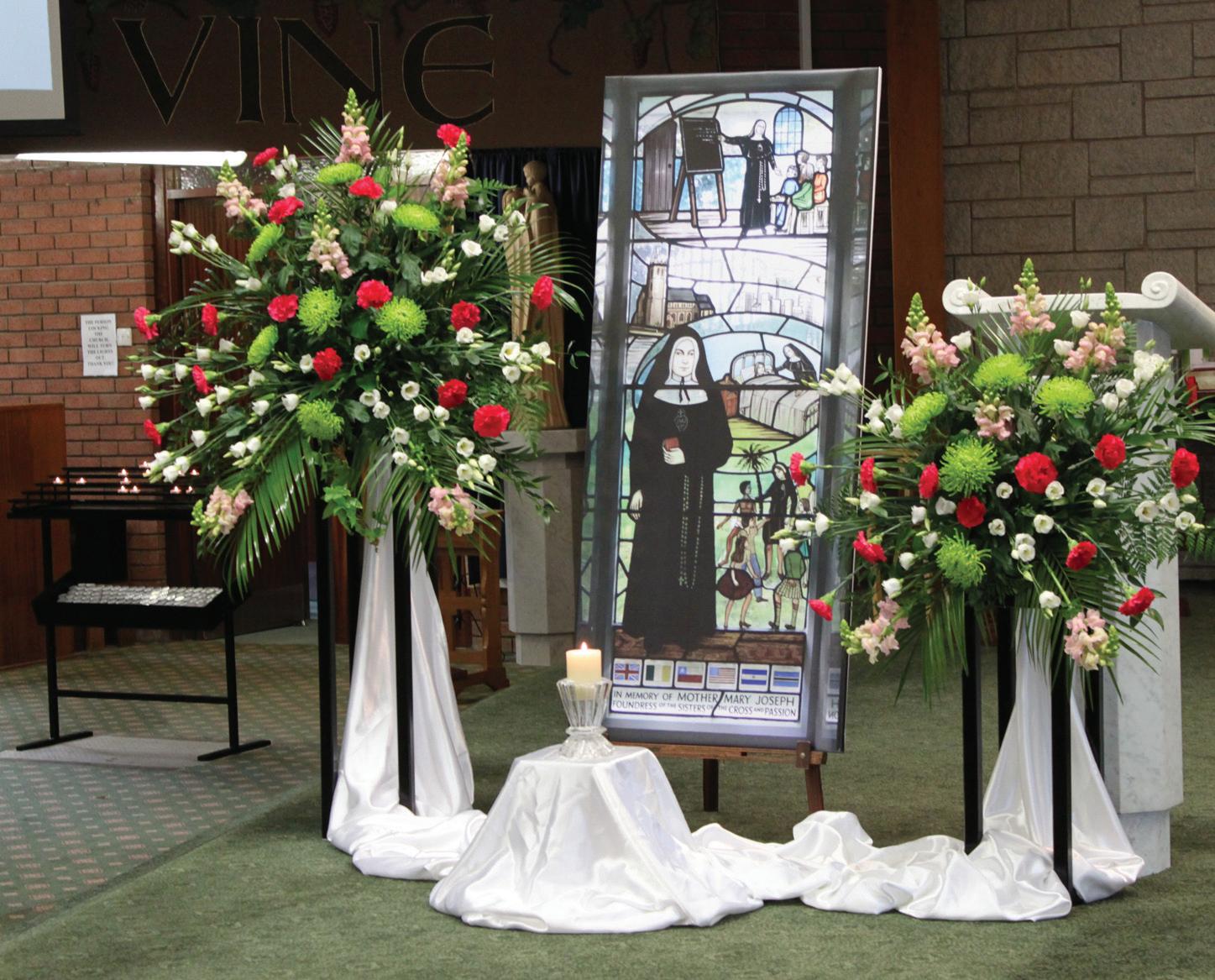
which joined Our Lady’s parish to that of Christ the King, the Sisters in Wavertree left their convent in North Drive to be nearer the church of Christ the King and Our Lady, where they remain today. All the Sisters of the Cross and Passion throughout the world have a special affection for St Anne’s parish, Sutton, because it was in their convent there that their Foundress, Mother Mary Joseph died on 11 January 1864 as the Servant of God, Father Ignatius Spencer CP gave her Final Absolution. After a Requiem Mass sung by the Passionists and Sisters in the Sutton monastery church, she was buried in the adjacent graveyard. In 1973 her coffin was exhumed and her remains were placed in a sepulchre on the right of the tomb of Blessed Dominic Barberi CP in the new church of St Anne and Blessed Dominic. The remains of Father Ignatius Spencer are in a sepulchre on the left of Blessed Dominic’s tomb. Elizabeth Prout had been born in Shrewsbury. By 1842, however, she was living in Stone, Staffordshire when Blessed Dominic Barberi CP arrived there to found the first Passionist Retreat in England. Previously an Anglican, Elizabeth became a Catholic between 1842 and 1848, when she entered a convent in Northampton. She became ill, however, and had to return to Stone. In early 1849 Father Gaudentius Rossi CP gave a Mission in St Chad’s, Manchester and heard that the parish priest, Father Robert Croskell was looking for a schoolmistress to take charge of St Chad’s girls’ school in George Leigh Street in Ancoats, Manchester. When Elizabeth had recovered from her illness but was being pressurised by her mother to abandon her Catholic Faith, Father Gaudentius suggested that she might take that post. About early September 1849, therefore, she arrived in Manchester and lodged in a house in Stocks Street beside St Chad’s new church at Cheetham Hill. Shortly afterwards Father Gaudentius invited her to co-operate with him and Father Croskell, with the approval of Bishop William Turner of Salford, in founding a new Congregation to give a contemplative and active religious life to women who could not afford the dowry required by the established Orders and
did not wish to be lay Sisters. She agreed and founded our Congregation with six other Sisters at St Joseph’s convent, 69 Stocks Street, on 21 November 1852 when Father Gaudentius presided over the first Clothing ceremony. The first group of Sisters professed their Vows before Bishop William Turner on 21 November 1854 in their convent in Levenshulme. Then, at Bishop Turner’s request, on 1 January 1855 Mother Mary Joseph opened a second convent in AshtonUnder-Lyne. It was from there that she arrived in Sutton. We can imitate Elizabeth Prout in many ways and pray to her with confidence. She was such a practical person; so entirely God-centred; so forgetful of self; so generous in giving herself to others; so willing to suffer in union with Our Lord’s Passion, always so that God’s Will might be done; and so charitable in protecting the reputations of even her enemies, even at great loss to her own. Pray to her about a practical difficulty and it will be solved in the twinkling of an eye. It need not surprise us that even her mother became a Catholic, nor that her father, too, returned to his Catholic Faith. At present all the material for her Cause presented to the Holy See has been accepted by the competent authorities, including a committee of theologians in Rome but we still await the verdict of the responsible Cardinals and Bishops that Church by Anna Sweeney, St Edmund of Canterbury, Waterloo The Little Church of St Edmund's Waterloo was hugely missed during lockdown. As churches began to reopen we realised it was not necessarily 'little one friendly' and certainly may be stressful for the parents so we had to get thinking and we launched Virtual Children's Liturgy. It is done through Zoom and takes place during the 10.00 am Mass just as it was done pre lockdown. We log on to watch Mass from home and our Parish Priest Father John Cullen invites the children watching to she should be entitled ‘Venerable’. After that only our successful pleas to her for miracles can raise her to the honours of Beatification and Canonisation. And so please pray to her and when she answers your prayers, send an accurate, detailed account to Father Paul Francis Spencer CP, Vice-Postulator, c/o Sister Dominic Savio Hamer CP, Cross and Passion Convent, 19 East Beach, Lytham, Lancashire, FY8 5EU. In the meantime it is possible to visit the various places connected with her: Shrewsbury, Stone, Aston Hall, St Chad’s and Sr Mary’s, Manchester as well as Sutton. Also the ‘Definitive Biography, Elizabeth Prout, 1820-1864, A Religious Life for Industrial England’, is available in paperback, written by Dr Edna Hamer (Sr Dominic Savio CP), the Historian for the Sisters of the Cross and Passion on the Historical Commission appointed by Archbishop Derek Worlock in 1994 to investigate the Cause for the ultimate Canonisation of the Servant of God. It was published first by Downside Abbey in 1994 and since 2011 by Gracewing Publishers, 2 Southern Ave, Leominster, Herefordshire, HR6 OQF. In 2008 Gracewing published a shorter, more ‘popular life: With Christ in His Passion, Elizabeth Prout (1820-1864), Foundress of the Sisters of the Cross and Passion of Our Lord Jesus Christ’, also written by Sr Dominic Savio; and in 2009 the Catholic Truth Society, London published
Virtual Little
a booklet: Sr Elizabeth Prout. join Virtual Little Church after the Gloria. We then come together with some on video, audio or simply present to listen to meet the needs of our families. The catechist leads our welcome, we sing and listen to the Gospel but can share videos to support the understanding of the Gospel message. Before joining families are asked to acknowledge guidelines to cover safeguarding. Virtual Little Church has grown from strength to strength each week and has brought Church into our homes for our children. Our highlight so far has been welcoming our lockdown baby to our Church family. We will continue this as long as we need to and will celebrate when we can be physically together once again.
Obituary of Deacon Michael McGlynn
Deacon Michael McGlynn who served at St Mary, Birchley died suddenly on Tuesday 4 August at Wigan Infirmary, aged 74 years. He had been a deacon for 24 years. Michael Thomas McGlynn was born on 17 May 1946. He married Christine at St Mary’s, Birchley, on 2 August 1975, and together they had two daughters, Clare and Lisa. He was a teacher and finished his career as an Assistant Headteacher. He was ordained to the permanent diaconate at the Metropolitan Cathedral of Christ the King on 23 June 1996 to serve at St Mary’s, Birchley. The following was posted on the parish Facebook page: ‘With deepest regret we announce the sudden passing of Deacon Mike McGlynn of St Mary’s, Birchley. Our love, prayers and condolences are extended to Mike’s wife, Chris, his daughters, Clare and Lisa, his grandchildren and wider family. ‘Mike served Birchley parish tirelessly and without reserve. His ministry of service to the Archdiocese and alongside Father Paul Harris (and Father Bernard Jackson) will be forever appreciated, furthermore - and most especially - by the countless people he ministered to as a deacon of the Church. ‘For the babies baptised, the couples married, the sick visited, the homilies preached, the dead buried: May God reward you and grant you a place at the Liturgy of Heaven.’ Deacon Michael’s Funeral Mass was celebrated on Friday 14 August at St Mary’s, Birchley, prior to interment in the churchyard.
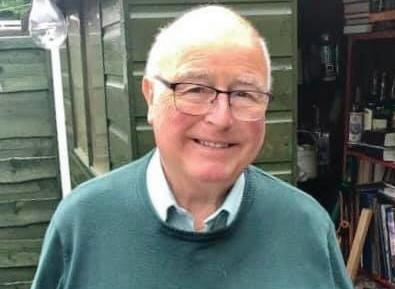
National Board of Catholic Women publishes booklet on domestic abuse
In order to raise awareness within the Catholic community of domestic abuse and the impact upon victims and their children, the National Board of Catholic Women (NBCW) has released a booklet that offers pastoral care and guidance. Commending the booklet, the Bishops’ Conference Liaison to the NBCW, Abbot Hugh Allan, O.Praem, believes its publication is particularly timely: ‘At a time when the crisis around the pandemic has seen an increase in cases of domestic abuse, this timely booklet from the National Board of Catholic Women is an excellent resource for all of us. ‘The masterpiece of creation is a human being. This great dignity is the birth right of everyone. The welfare and safety of all God’s children is a something every Christian has a responsibility to act upon. No one should ever live in fear of violence, or of any kind of abuse.’ The booklet contains notes on Church teaching on violence in relationships –including extracts from the 2016 Apostolic Exhortation ‘Amoris Laetitia’ – and provides useful links and resources to help both those suffering in various situations of domestic abuse and also survivors who need time, space and help to recover. Preventing and combating domestic abuse is a shared responsibility and the booklet contains a section offering simple, practical guidance to Catholics who want to play their part. Margaret Clark, President of the National Board of Catholic Women England and Wales says, ‘this booklet is primarily intended to raise awareness in the Church of the devastating effects of domestic abuse and violence. We hope it will help victims get the support they need through the pastoral care of parishes, organisations and individuals. We hope the booklet will encourage its readers to seek out and support initiatives, publicising them more widely
Christian Heritage Centre online
The Christian Heritage Centre at Stonyhurst will be offering a series of online talks, ‘Saints, Scholars and Spiritual Masters’, over the next few months, exploring some of the great figures of Western spirituality with well-known experts. The free series will take place at 7:30 pm on Thursdays, beginning on 3 September and running through until 10 December. Register to receive a link, online at https://christianheritagecentre.com/event/saints-scholarsspiritual-masters/ or email events@christianheritagecentre.com. Alpha Online
There is an opportunity to be trained directly by the Alpha UK team with Alpha Online this Autumn. Mike Roche and Jo de
Paula will host three one hour sessions in September - register at https://www.alpha.org/catholic-context/
Thursday 3 September 7.30 pm - ‘Alpha Online 101’.
Thursday 10 September 7.30 pm - ‘How to host Alpha Online
Small Groups’.
Thursday 17 September 7.30 pm - ‘Prayer on Alpha Online’.
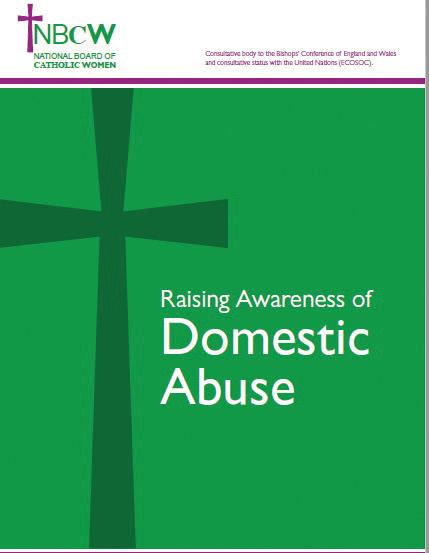

within their parishes. We believe that promoting a greater awareness of the problem will, together with the support of existing specialist support services and projects, be the most effective method by which Catholics will be able to help victims of
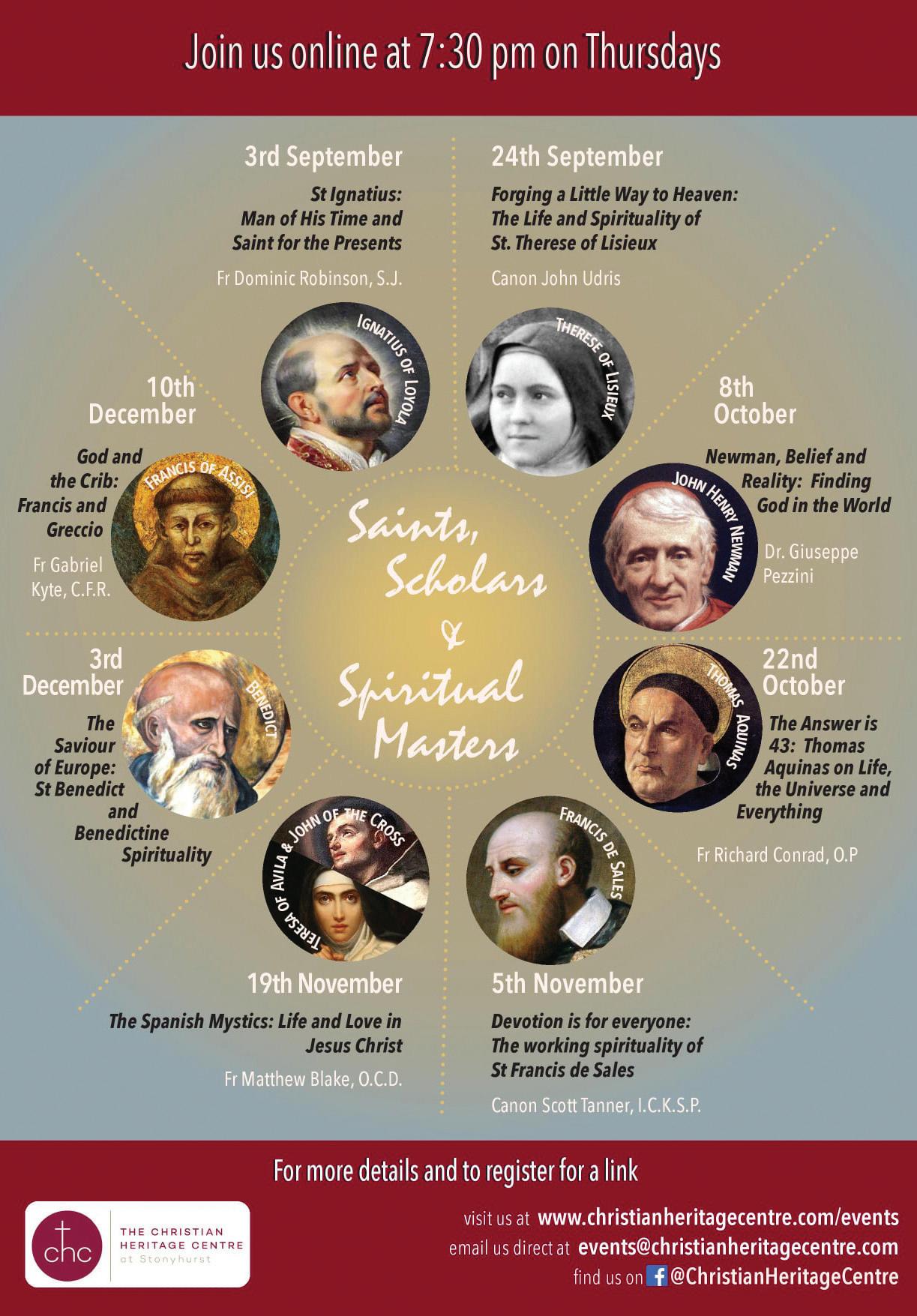
domestic abuse.’







